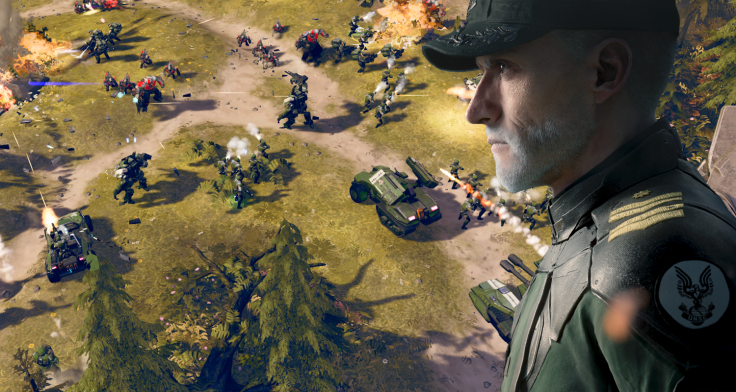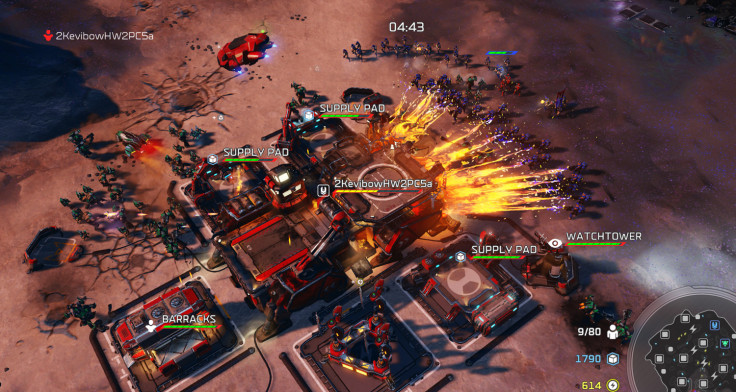How Halo Wars and the wider series humanises its futuristic military by focusing on people
Creative Assembly's strategy sequel continues a tradition of the Halo series.

From its beginning, the Halo series has stressed both the presence and importance of people. Sometimes, as with the jocular, Aussie-accented Marines in Combat Evolved, it has done so subtly. Other times, for example via Master Chief and The Arbiter's buddy cop relationship in Halo 3, or the many mawkish death scenes in Reach, it has been more explicit.
What has remained consistent is Halo's insinuation that, during its fictional war between the forces of the UNSC and The Covenant, individuals with faces, voices and occasionally unique behaviour, have fought and been killed. At the ground level of Halo there is a sense that people, not just uniforms, are dying.
By contrast, in Halo Wars and Halo Wars 2, you play a commander and view each battle from a bird's-eye view. Rather than single soldiers, you are concerned with entire divisions. Instead of protecting identifiable persons (or in The Arbiter's case, an alien) you attempt to win fights through sheer force of numbers.
As such, one is tempted to call the real-time strategy spin-offs crass: whatever efforts have been made to humanise individual troopers in the central series are undone by then having you view their lives and deaths as part of a dispassionate, overarching strategy. But playing Wars alongside the other Halos in fact provides a hopeful, albeit fantastical portrait of a modern war machine.
In The Silent Cartographer, mission five of Halo: Combat Evolved, Cortana explains that she – and by extension military intelligence - is uncertain which of the many buildings close to your drop zone contains the eponymous map of the Halo structure.
So, as the Marines land on the beach, systematically storm each possible location, and are gradually killed off, the vague information provided by UNSC's upper echelons feels partly responsible - the military brass seeming both incapable and unconcerned. However, where Combat Evolved shows sympathy to soldiers on the ground, portraying them as fighting their hardest against an overwhelming and often mysterious enemy force, Halo Wars extends a similar understanding to those people calling the shots.
As a commander in Halo Wars, you gather units and mount attacks. Some fail and end with deaths, some succeed and result in a mission accomplished. Rather than inept, you, as the commander, find yourself reacting to difficult circumstances to the best of your ability. It is impossible to fully predict the consequences of your actions but always you are hoping for, and acting toward, the best possible outcome.

In part, this sets a questionable moral precedent. By characterising the deaths of UNSC troops as always in service to a greater good, Halo Wars, perhaps indirectly, suggests that the interests of the hierarchy and the system are more important than the lives of individuals. On the contrary, representing large-scale military actions as part of a single commander's effort to do the right thing ingratiates to us the UNSC's practises and make it seem, unlike our real life armies, unfailingly humane.
Taken in isolation, a real-time strategy game in the vein of Halo Wars or Halo Wars 2 may feel cold-hearted - playing as a disembodied cursor, we make cool, mechanical, decisions, regarding war like an emotionless game of chess. But by implying so heavily in Combat Evolved, Reach, ODST and its other central titles that distinctive human beings are embroiled at the lowest level of war, the Halo series extends the same implication up the chain of command.
At the infantry level, the UNSC is overtly comprised of fallible (in the sense that they are mortal) people. It thus becomes easier to assume that, rather than the vague military power we normally assume in strategy games, our character in Halo Wars 2 is a person also, and therefore making decisions based partly on emotion, and therefore more empathetic. People are important in Halo not just to add drama and flavour to each individual battle, but to infer that the entire UNSC war effort is being fought, from the bottom up, not by intransigent, moustache twirling arch fiends but emotive human beings. It is, in the grandest sense, a human effort, led not by what we might regard as typical military ambition but bounteous altruism.
And though it results in the deaths of many soldiers, it is easy to sympathise and identify with the UNSC military system, not only because it is comprised of good, identifiable people, but because its objectives – stop the alien super weapon, save the universe – are uniformly noble.
The UNSC acts on behalf of humanity. Our own armies act on behalf of nations, and nations have self interests, and those self interests are variously fuelled by expansionism, provincialism and partisanship. What Halo provides then is an optimistic portrait of the military machine, whereby, at every level, individuals both have influence and use it to aid other individuals, all toward a common goal.
From the top to the bottom, the Halo games show us a military system. However, it is too humane and with too magnificent ambitions to be considered a true analogue. Operating, at least in part, based on national interests, and not pure, simple morality, Earth's armies are unfortunately unlike the UNSC. If war and the people fighting it were as simply moral in reality as they are in Halo, the world, presumably, would be a better place.
For all the latest video game news follow us on Twitter @IBTGamesUK
© Copyright IBTimes 2025. All rights reserved.



















